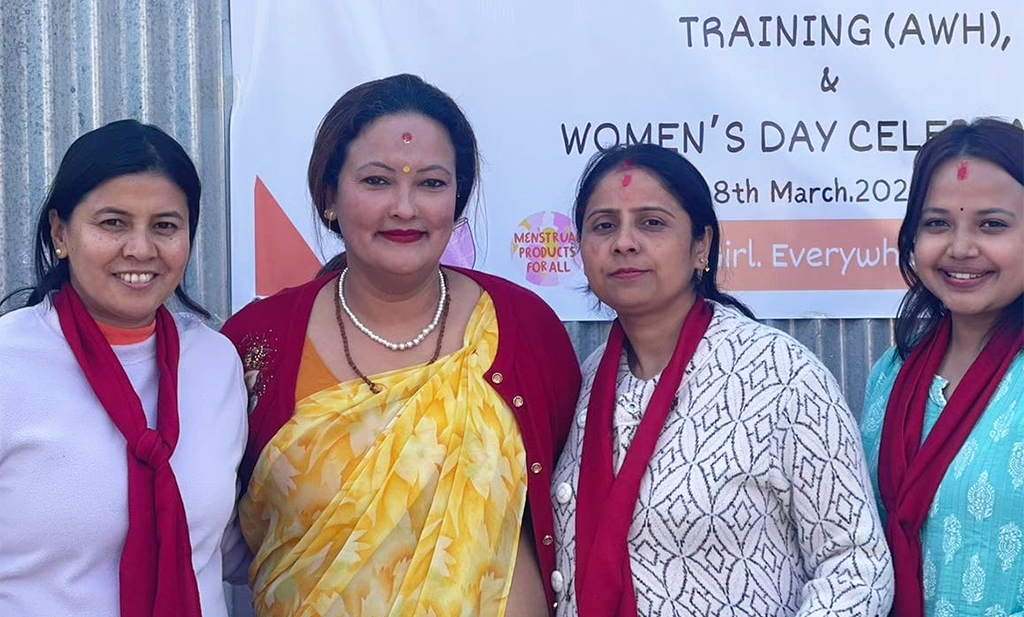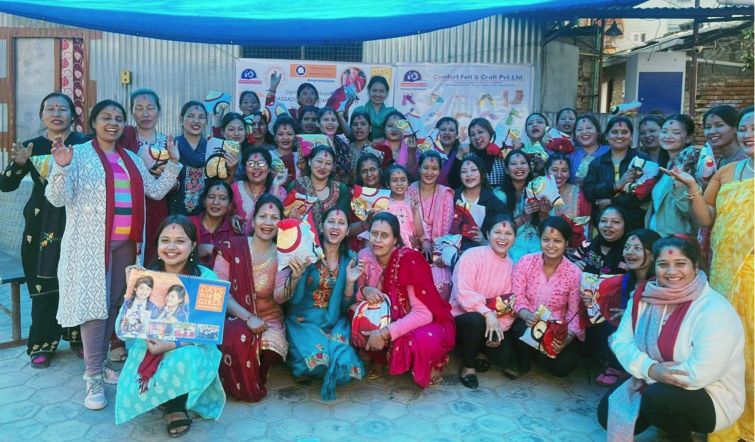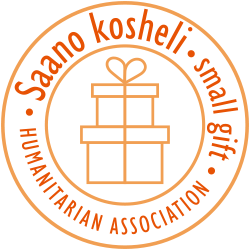sanitary pads
Menstruation is a natural process, not a taboo!
. . . . . . . . . . . . . . . . . . . . . . . . .
• DISTRIBUTION OF 225 PACKS OF REUSABLE AND WASHABLE SANITARY PADS
• EDUCATIONAL PROGRAMS
We are proud that already 1274 girls/women have received education and a packet of reusable sanitary pads from Saano kosheli
. . . . . . . . . . . . . . . . . . . . . . . . .
MAY 30 • MENSTRUAL HYGIENE DAY WITH MAYA •
Maya Khaitu from DFGN, together with Saano Kosheli, organised a training at a special high school. “In the hall of the school, resilience and determination are palpable. Despite the challenges they face, the students display a remarkable spirit of perseverance. This school is more than an educational institution; it is a family, united in the shared goal of educating young minds and creating opportunities for a better future.”
Special school
This school is a beacon of hope and provides opportunities for students from disadvantaged backgrounds who would otherwise be unable to attend school. In fact, the school runs in two shifts and caters to the availability and accessibility needs of its students. Many students who attend the morning (or afternoon) classes are able to combine this with a job to contribute to their family’s livelihood and vice versa.
Maya and Seema give sessions on puberty, menstruation and how babies are born.
The girls felt comfortable as they realised that these topics are important in their daily lives. The students’ proactivity and involvement made the event very energetic and successful.
Menstruation, the female menstrual cycle, the importance of personal hygiene and hand washing techniques are discussed. Definition and meaning of self-defense with basic techniques is also introduced. And how to properly use washable sanitary pads is demonstrated. Maya “Menstruation is defined as the monthly flow of blood from the uterus through the vagina and menstruation is a natural process. If we didn’t menstruate, there would be no humans.”
Taboo and education
The girls (77 and a 50-year-old woman) actively participated and were eager to learn new things and ask questions about menstruation, their religion Hinduism (♥︎ more about Nepal) and taboos. By openly addressing their questions and providing factual information, this session helped the students revise their initial perspectives. By the end of the session, they no longer considered menstruation unclean and were willing to visit temples during their periods (♥︎ more about this taboo). This shift in mindset shows how powerful education is in challenging misconceptions and learning to accept natural body processes.
The girls were determined to share what they learned with their families, friends and their community.
RECOMMENDATION TO THE SCHOOL
• Organise regular sessions on menstrual health and hygiene, reproductive health and debunking myths and misconceptions
• Provide training sessions for teachers so that they have knowledge and skills to educate in an effective, sensitive and inclusive manner
• Establish a supportive and open environment within the school community to encourage students to ask questions and seek advice about menstrual health and hygiene.
RECOMMENDATION TO LOCAL AUTHORITIES AND COMMUNITY
• Involve community members and stakeholders regularly in awareness-raising events like sessions and trainings on menstrual health and hygiene
• Create safe spaces or a menstrual club with school students, community women, FCHVs* and male influencers for women, girls and children to talk and ask questions without hesitation and shame
• Initiate discussions on menstrual health and hygiene in public spaces and do not promote menstruation as a taboo topic.
*FCHVs-Nepal’s Female Community Health Volunteers focus on maternal and child health services.
. . . . . . . . . . . . . . . . . . . . . . . . .

8 MARCH • INTERNATIONAL WOMEN’S DAY WITH MAYA
Maya Khaitu from DFGN: “Days for Girls Nepal is a non-profit ngo. We believe that every woman and girl should have ready access to hygiene supplies and education”. Days for Girls envisions a world where menstruation is no longer a cause of shame and taboos through volunteers, enterprise, and public and private partnerships. We work to eliminate the stigma and limitations associated with menstruation so that women and girls have improved health, education and livelihoods. By removing menstrual-related barriers, we empower women and girls to pursue opportunities and achieve their goals.”
Education to become an Ambassador of Women’s Health • AWH
Our staff provide this session on puberty, menstruation, menstrual cycle and how babies happen. “Menstruation is defined as the monthly flow of blood from the uterus through the vagina and menstruation is a natural process. If there is no period there won’t be any people. The goal of todays training is to empower women and girls in the local community to be ambassadors of education and information on women’s health. This creates a deeper sense of local ownership of menstruation health within their communities.”
Training session for 44 women of Comfort Felt & Craft
Participants of this factory learned a lot about menstruation and how to maintain their health and hygiene during this period. They felt comfortable as they realised that these topics are important to them in their day-to-day lives. Participants also showed interest in taking part in such training again in the near future. They were determined to share their learning with their communities as well, this day was successfully completed.
. . . . . . . . . . . . . . . . . . . . . . . . . . . . . . .
CHALLENGES
• At first, women were unfamiliar with the session.
• Some women felt awkward to open up about the menstruation.
• Some women felt difficult to read the questions due to illiteracy.
• It was recommended that we conduct such training for women in the communities and for boys as well.
SUGGESTION
Factories should also focus on encouraging women for use of reusable pads rather than disposable ones.
. . . . . . . . . . . . . . . . . . . . . . . . . . . . . . .

• Testimonial woman, age 28 “My menstruation was started at the age of 14. I remember that my mother and sister told me about menstruation. In our society there is different perspective about menstruation so I was kept in cow shed. That time I was feeling different because during menstruation my eating place and bathing place was made different. That time I used to wear cloth and I loved that today I got DFG reusable sanitary pads which has waterproof cloth so there will not be any kind of leakage.”
• Testimonial woman, age 39 “I was so afraid at that time when I saw the blood in my bed when I woke up. I was only 13 years old. My mom told me that my menstruation had started and took me to cowshed. I was never aware about the menstruation so I was scared. Today I got DFG reusable sanitary pads and I am so happy that it is reusable. Some women carry heavy loads due to compulsion but this session has aware us that during menstrual period we should work carefully and smartly.”
• Testimonial woman, age 37 “I use disposable pads. I felt very happy to participate in DFGN’s AWH training. I was aware about the menstruation but today I learnt more about it. There is friendly environment in my office so I feel comfortable to work in my office but today I learnt that we should not carry heavy loads during menstrual period and rest and we can do everything during menstruation which we can do while not menstruating. I don’t have daughter but I will share the information with my sisters. DFG reusable sanitary pads is far better than disposable pad because it is environment friendly and save our money also.”
• Testimonial woman, age 42 “Today’s training was very beneficial for us. I really enjoy it and there was lots of curiosity inside me and I got all the answer. This training was so necessary for this place where there is more female employee. We were aware about importance of training but we did not have enough time to participate due to our busy schedule. I use both reusable sanitary pads and cloth to manage my period. I think cloth is better to use because when we wash cloth and dry in sunlight then germs will be killed. I feel so happy that DFG pad is waterproof like other sanitary pads.”
Costs of city life
Saano kosheli thinks that also in the capital Kathmandu there is huge need for this kind of education session and for the reusable sanitary pads. The women of Comfort Felt & Craft earn a very fair living but costs are extremely high in the capital. For a lot of women living here is a struggle but at least they have work! Nepalese men are not very emancipated so women do all the housework in addition to their employment. Besides that, many parts of the city are not connected to the water grid system so they have to get it. Houses can be very cold in winter time during the night and are not insulated, gasbottles are too expensive too.
There are many wonderful religious festivals in Nepal and the social pressure is great. The house has to be cleaned, the house altar has to be decorated, everyone has to wear new clothes and meals have to be prepared for all the guests. This also puts considerable distress on financial spending. So this small gift is a modest relief from their monthly expenses.
. . . . . . . . . . . . . . . . . . . . . . . . .
8 MARCH • INTERNATIONAL WOMEN’S DAY WITH SUSMA
This year, our friend Susma travelled to south-west Nepal, the region of our colleague Nuru who is still studying and and has no time right now. Once there, she travels with all the material in a tempo (local cab) to various villages in this delta area. Now it is still spring and dry but during the rainy season (June-September) it turns into an impassable area here, with churning rivers, flooded mud roads and residents are sometimes driven out of their homes. It is a very poor region with some agriculture. The majority of the male population seeks work in India and women try to find work as domestic help. It is the terroir of the Tharu and the Majhi, some of 141 ethnicities in Nepal with their own language and traditions.
Educational programme
Menstruation is also a taboo subject in this area and knowledge about one’s own body is very limited. Educating is very important to us at Saano kosheli. Therefore, Susma is using DFGN’s teaching materials, with text and expications about menstruation, menstrual health & hygiene and the reproductive cycle. Like everywhere else in Nepal, the girls and women are expectant and timid, but as they got more comfortable, they started to talk openly about their own periods, which is a big change from how it used to be when people didn’t talk about it because of shame or embarrassment. Since Susma does not speak the local language, a few women helped her translate.
In 3 days, Susma educated and distributed 104 packets of reusable and washable sanitary pads, along with matching gifts*, 10 hot water bottles and some Menstrupedia**.
So with the help of these menstrual kits, women got really involved in discussions about periods. They talk about it openly, breaking the taboo around the topic and making it a normal part of their lives.
By starting these conversations, we hope this is just the beginning of more freedom for all girls/women in nepalese communities
. . . . . . . . . . . . . . . . . . . . . . . . .













